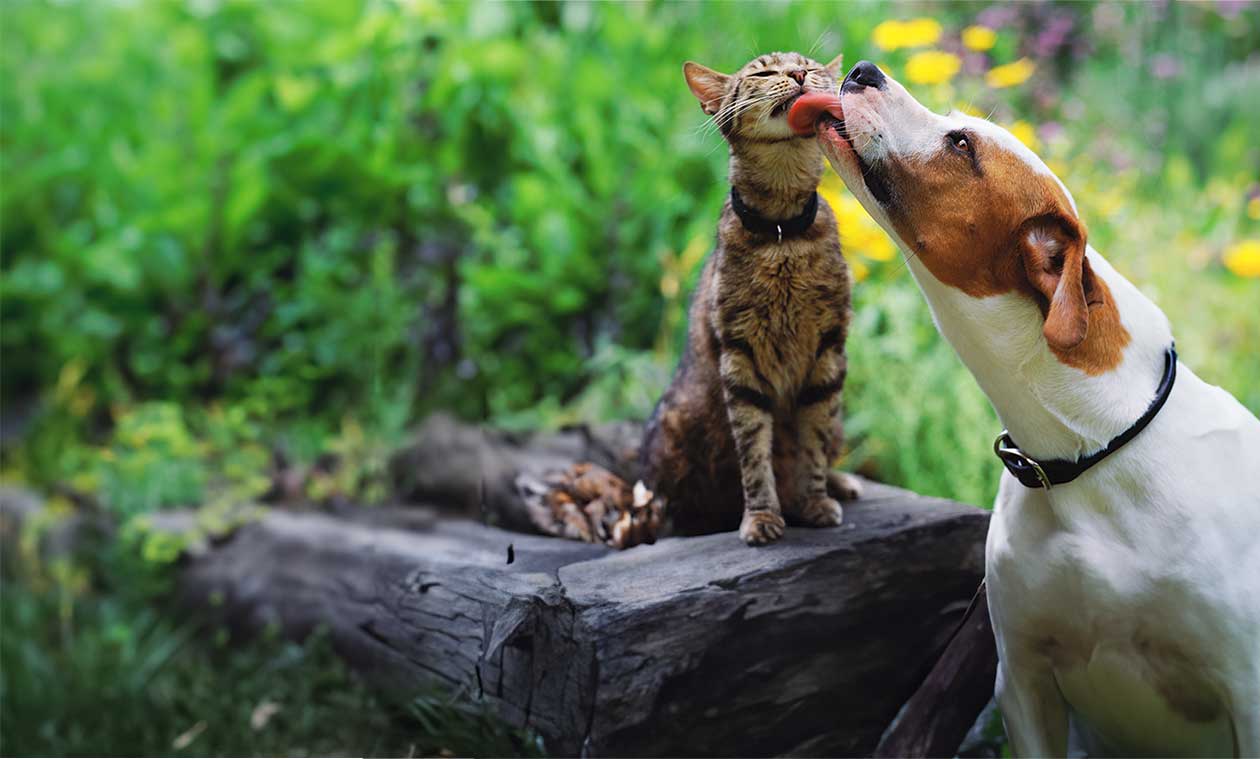
Exercising your pet
Your pet needs regular exercise, just like you. Here's some helpful advice on how to keep your pet fit and healthy which can help prevent future problems.
Published:21 January 2025
Your dog or cat may look loveable, but are they healthy? Half of pets over the age of seven are thought to be clinically obese – which is why exercise is key to keeping pet obesity at bay and ensuring your furriest family member is fit for life.
The right weight
Much like their owners, it's possible for pets to become obese if they don't eat the right diet or get enough exercise – which is why keeping your pet active is vital for their health, welfare and longevity. To ensure your cat or dog doesn't pile on the pounds, head to your local vet, where it's usually free to pop your pet on the scales and see how they're weighing up. The 'ideal weight' will vary according to the animal's gender and breed, but if you think you have cause for concern, ask your vet to assess your pet's physical condition. There are also some checks you can do at home; vets say you should be able to feel your pet's ribs easily, without seeing them, and that you should be able to spot a waist and to see a tummy that tucks inwards, rather than one that bulges outwards. Doting owners can be oblivious to porkier pets, but too many treats and not enough exercise can cause serious health issues, such as diabetes, high blood pressure, heart disease and breathing problems. If you believe your beloved pet is on the plump side, a vet-approved diet and exercise plan will help them shed the extra pounds, and improve their health in the process.
Walking your dog
Dogs love nothing more than bounding around a park or garden – and such exercise is essential to avoid pet obesity. Your canine friend will want ample chance to walk, run and play outdoors. Just how much activity they need will come down to age, breed and health: for instance, while a Labrador will need loads of exercise all his life, small breeds such as dachshunds will be happy with a daily walk and play in the garden. Whatever the breed, though, vets agree that owners should be willing to walk their dog daily. If you're not able to do so, then you could always employ a dog walker to do it for you, or call on a dog-loving neighbour or friend.
On a leash
Teaching your dog to walk on a lead from an early age will start them off on the right paw: it will keep them safe from traffic in towns and cities, stop them chasing cows in the countryside and remove the risk of them urinating or defecating where young children play. Taking your pup or dog to a training class is one way to learn this together – ask your vet to suggest some in your area. The RSPCA recommends those that use kind, reward-based methods of teaching. Consider what your canine friend should wear when he or she steps out on a lead too: short-nosed breeds, such as pugs, or toy breeds, such as tiny chihuahuas, are thought to be more comfortable in a harness than a collar. While for big dogs the RSPCA recommend the 'Halti' collar as an alternative to 'choke chains'.
Exercise for your cat
Exercise for pets isn't just for dogs: cats need to get active too! If your cat is constantly out on the prowl, their daily pursuits will likely keep them slim. If your feline friend is an indoor cat, though – or simply more fond of sitting on the sofa than chasing mice – they may need some help. As clever creatures, cats can get bored indoors, which can lead to stress and pet obesity, so it's up to humans to provide activities. Experts suggest placing some of your cat's everyday food at the top of your stairs to encourage climbing, bringing in a sturdy scratching post that's tall enough for them to use when fully stretched or using a fishing rod toy or ball to get them moving. If your cat is totally fed up with its toys, adding a dab of catnip can be one way to spark a whole new interest…
Looking for more information?
Tesco Pet Insurance includes vetfone
Get advice for your pet, whenever you need it. Just call the vetfone helpline.
- Talk to vets and nurses registered with the Royal College of Veterinary SurgeonsTalk to vets and nurses registered with the Royal College of Veterinary Surgeons
- 24/7 phone, live chat and video calls24/7 phone, live chat and video calls
- Unlimited access, at no extra costUnlimited access, at no extra cost
Important information
Tesco Pet Insurance is arranged, administered and underwritten by Pinnacle Insurance plc. Tesco Personal Finance Ltd acts as an introducer to Pinnacle Insurance plc which is authorised by the Prudential Regulation Authority and regulated by the Financial Conduct Authority and the Prudential Regulation Authority (register number 110866). Registered Office: Pinnacle House, A1 Barnet Way, Borehamwood, Hertfordshire, WD6 2XX. Tesco Personal Finance Ltd and Pinnacle Insurance plc are not part of the same corporate group.
Vetfone is provided by Vetsdirect Ltd.
Tesco Insurance is a trading name of Tesco Personal Finance Ltd, Registered Office: 2 South Gyle Crescent, Edinburgh, EH12 9FQ (registered in Scotland, no SC173199) which is authorised and regulated by the Financial Conduct Authority (register no. 186022).
We do not provide personal recommendations to customers.
The content on this page aims to offer an informative introduction to the subject matter but does not constitute expert advice specific to your own situation. All facts were correct at time of publication and were compiled using a range of sources.